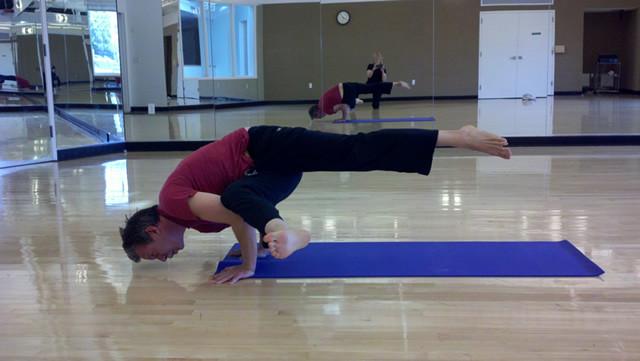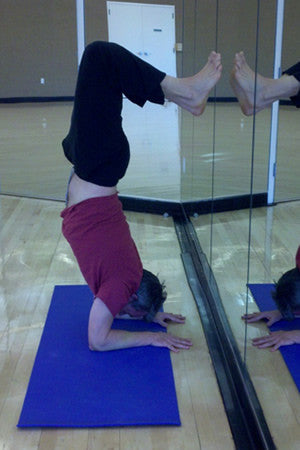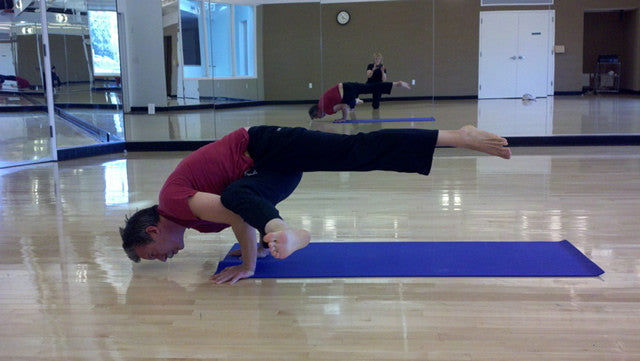
You Teach What You Most Need To Learn
When I first got into the stress management business over twenty five years ago, I was stress sensitive (see my previous blog entitled: Are You Stress Sensitive?) and I didn't even know it. Over the first ten years in this business I would occasionally suffer from stress-related health problems and not even fully appreciate the irony, or even care. And that's one of the enduring mysteries of stress: why we don't always see how stress affects us. Why we don't see how grumpy we've become, or how easily upset we've become, or why we ignore the headaches we get or the colds we catch or the stomach pain we experience after a particularly stressful episode in our lives. For some reason, we just don't connect the dots back to our stress, or if we do, we never really see it clearly enough to do much of anything about it.
And this even applies to so-called experts on stress like me! I guess that's why they say you teach what you most need to learn.
So here's a list of some of the stress-related conditions that affected me over the first ten years of running a stress management business and some of the counterproductive coping strategies I'd employ to deal with them.
| Problem | Old Solution |
|---|---|
| Tension headaches every afternoon around 3PM | 2 Ibuprofen |
| Recurrent colds that would last a month or more | Lots of antihistamines |
| Coughing that would keep me awake a night | Prescription cough medicine w/codeine |
| Cramping muscle pain in my shoulders | Prescription muscle relaxers |
| Chronic pain in my hips and legs | prescription pain killers |
| Worry | 1 glass of wine |
| Anxiety | 2 glasses of wine |
| Anger | 3 glasses of wine |
| Insomnia | Sleeping pills or wine |
| Fear of flying | Stopped flying for 5 years after 9/11 |
| Depression | Emotional eating (gained 30 pounds) |
| Panic attacks on long highway bridges | Avoided highway driving and bridges |
Let me be the first to say, that when you suffer from a stress related condition, stress is usually just one component of the problem and not necessarily the cause of it. Stress just makes things worse, makes you more vulnerable to developing the problem and that's why it's a tricky thing for doctors to diagnose. For example, when I would catch a cold, one of my three kids would usually get it first, so, unless you are your own doctor, who's to say whether it was the stress in my life that made me vulnerable or the rhinovirus that I was exposed to? Still studies conducted at Carnegie Mellon University (where test subjects were exposed to the rhino virus and then sequestered for five days) have shown that the study participants who reported high levels of stress, were much more likely to develop colds than those who reported little or no stress.

This is not me, but fifteen years ago it could as well have. I was 30 pounds overweight, and dependent on aspirin and other over-the-counter drugs to help me make it through the day.
So without really knowing conclusively whether my illnesses were stress related, none of these health problems bothered me too much. I just tried to ignore them until they went away and usually they did. For example, long before 9/11 I was afraid of flying, but I'd still fly when I had to. After 9/11 I just started driving everywhere including destinations that were 16 and 20 hours drive away. But I assumed that if I ever really needed to fly some place I would. And when I'd get sick for up to a month, with a cold and the sinus infections that would inevitably follow, I just figured that was normal. And eventually the cold and the sinus infection would clear up.
But when I started having panic attacks, (mostly driving on highways and over long bridges - which BTW had NEVER bothered me before) the overall levels of stress in my life, (and my increasing vulnerability to it) that I had been basically ignoring for so long, finally had to be addressed. But before I tell you exactly what I did to right my ship, let me tell you what I did wrong for so long to bring me to this point.
In a nutshell, I always chose the simplest, easiest solution to my stress-related problems (as most Americans do). But these band-aid solutions would only MASK the SYMPTOMS of the problem. At first I did things like take more and more ibuprofen. Then I tried drinking more and more wine. Later I tried just avoiding the problem altogether, by not doing things like flying. I was attempting to mask the symptoms without addressing them at the source.
This is often called counter-productive coping and refers to the fact that we cope with our stress by engaging in lots of unhealthy behaviors such as smoking, drinking, overspending, gambling and emotional eating. The reason we engage in these behaviors is to distract ourselves from the stress we feel inside. It makes us feel better temporarily, but often leads to other problems like weight gain, financial problems and substance abuse. This phenomenon is often called self-medicating and we self-medicate with both substances and behaviors including over-the-counter medications, street drugs and/or behaviors like gambling and high risk activities. Some people even go to their doctor and get hooked on many of the prescriptive solutions to these problems like sleeping pills, pain killers, cough medicine and medicines for heart burn and other digestive tract disorders.
The trouble with these approaches is that you are treating your symptoms and not addressing the source of the problem. In fact, this is roughly the equivalent of disabling a warning light on the dashboard of your car rather than fixing the problem that is causing the warning light to flash.
By disabling the warning light, you have only masked a symptom of the problem. And with all of the stressful problems on my list, that's exactly what I did. And you know what? If you're going through a stressful period in your life that is only TEMPORARY, this MASKING approach can actually work: it helps get you through the stressful crisis. It helps you keep going. And when your stress eventually subsides, you stop taking the medicine and your life returns back to normal. (Because you masked the symptoms of your stress it was barely just a blip on your radar screen.)
But many of us are chronically stressed, or our stress comes back with a vengeance after a short period of remission. As a result, the pain (that you were able to at first ignore) gets worse and worse while you keep attempting to cover it up. Eventually the only reason you are able to KEEP GOING is that you are pharmaceutically propping yourself up. Your symptoms (which you are carefully trying to cover up) are your body's way of saying SLOW DOWN. But you can't hear the message because you've disabled the warning light! And of course this simply creates a vicious cycle where eventually the pain spirals out of control and the medication doesn't really stop the pain.
And because stress is genuinely complicated to treat doctors don't have the time to get to the root of the problem: How is your doctor (during a 5-10 minute office visit) supposed to tell if it's your bad marriage, your horrible commute, your nasty boss or some combination of the above that is the true source of your distress? Besides, he is probably not even going to ask you those kinds of questions to begin with.
So he cuts to the chase and says, "here's a pill that I can prescribe that will dull the pain." And what goes unstated is: I don't have time to figure out what's really causing your pain but I can be pretty sure that this pill will stop it. The sad part is when you leave the doctor's office believing that this solution to the problem is THE ONLY SOLUTION or the BEST solution. Or worse yet, that it's actually going to SOLVE the problem which in most cases, it WON'T. (It's only masking the symptoms of the problem and helping you get by for now.)
Even heartburn medication, which truly can heal the lining of your stomach, doesn't address what's causing the lining to become irritated in the first place. And if stress is involved in this equation then you are surely not addressing this component of the problem by taking a little "purple pill," for example.
But, even though this may seem to you (the patient) like the best that main-stream medicine has to offer, it really isn't. It's just the most expedient solution: Because it's the quickest and easiest. But here's the good news, there are lots of medically approved, integrative* approaches to solving your stress-related health problems that don't involve, taking pills, drinking wine or eating bags and bags of chips or cartons and cartons of ice cream like I did for years. And it took me finally having a panic attack on my way to a wedding in Pittsburgh, to really get serious about my own stress. So in that way, those panic attacks were crucial in giving me the wake-up call that I needed to finally start WALKING MY TALK about stress!

This isn't me, but I've been doing three Yoga classes a week for about five years. I'm 56 and I can actually do this pose now against a wall, although I ALWAYS do it with my shirt ON. It's not quite as hard as it looks. It's called pinchamayarasana.

This is me! I'm not quite ready for the cover of Yoga Journal, but my feet are actually a few inches away from the mirror and my head is off the mat (this is not a head stand pose).
Exercise, yoga, meditation, and deep breathing are just a few of the ways that I manage my stress now. And while I still experience stress and occasional moodiness, I never get headaches anymore. I rarely if ever take ibuprofen anymore. (I take no prescription medicines what-so-ever even though the average person my age takes about FIVE a day!) I have had only one cold in over two years. I've thrown away my "precious" bottle of cough medicine with codeine in it. My chronic pain is mostly gone. (But if I stop exercising AND doing yoga for more than a few days in a row, it comes screaming back.)
I worry a LOT less. My anger is under control. I NEVER need sleeping pills - although I still occasionally have trouble sleeping. But I meditate now until I fall back to sleep. I fly all over the country. I haven't had a bout of depression in over five years now (even though I had at least two major bouts prior to that) I take no anti-depressants and I enjoy driving over really LONG bridges now including the 17-mile Chesapeake Bay bridge tunnel, which I just drove over a few months ago. (I got over this particular fear, which popped out of nowhere - as panic attacks often do - by driving over one particularly long bridge on the Hudson River again and again and again until the panic finally subsided, and it's never returned. This is called in-vivo desensitization and I will write more extensively about my panic attacks and getting over them in a future blog.)
While all this may sound miraculous, or hard to believe, or especially ironic, given my field of expertise, I'm not exaggerating the degree of the problem or the extent of the solution. This is not to say, that I now a live a life that is stress free. Far from it, I often still get stressed and still have stressful days, and even feel anxious about financial issues and many other issues from time to time. But given what I do for a living I was even more determined to find some sort of natural coping strategy for each and every stress-related problem listed above and do so without experiencing ANY compromising side effects. In other words, I wanted solutions that didn't involve pills, over-the-counter remedies, alcohol or recreational drugs.
As you can see, my list of stress-related problems was not a short list. And for me, I was spared many other stress-related complications like allergies, asthma, intestinal problems, colitis, infertility, migraines, rashes and erectile dysfunction, diabetes, obesity and heart disease. While not all of these problems are exclusively caused by stress, stress can contribute to each one of them and make the difference between having a manageable problem and a health disorder.
I still have plenty of stress, but I don't suffer from stress-related disorders. Years after starting StressStop.com, wholly dedicated to helping people learn how to manage stress, I finally started to realize that I was the one who needed to get help. And the panic attacks were the health crisis I needed to push me beyond the band-aid solutions I had embraced previously. That's when I decided to start exercising vigorously on an exercise bike for a half hour on most days. That's when I decided to start meditating for a half hour when I first wake up on most days. And that's when I started going to yoga classes at least three days a week.
And in choosing this healthier path to follow, I feel a bit like Robert Frost who in his famous poem: THE ROAD LESS TRAVELED wrote: "I chose the road less traveled by, and that has made all the difference."

Here I am doing sideways crow pose. Arm balance poses take a fair amount of upper-body strength.
*More and more hospitals are starting integrative medicine departments which provide "complementary" solutions such as biofeedback, yoga, meditation and acupuncture.









James Porter
Author